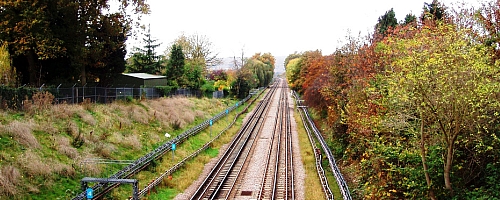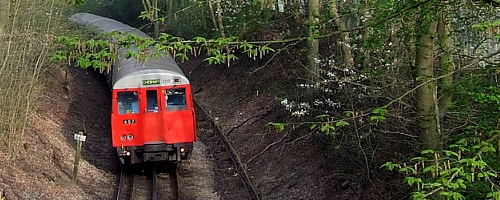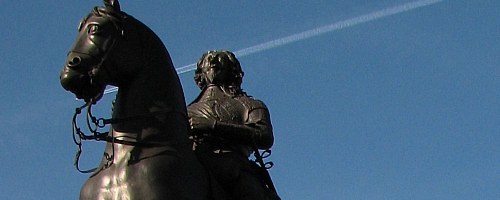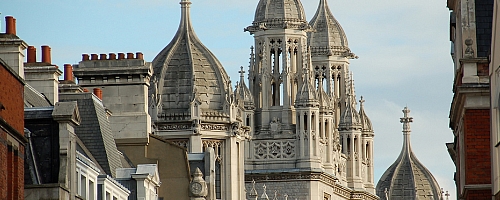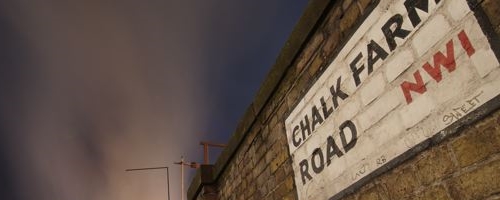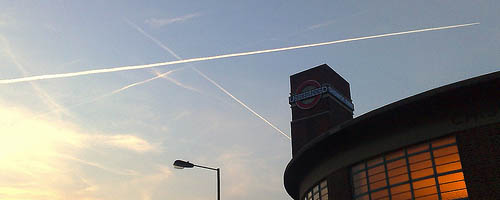
Picture by markhillary: Chiswick Park Station
Theodore checks the back of the box, and sets the timer for 25 minutes. He’s done everything right: the eggs are room temperature, the room is room temperature, the milk is cold and full-fat. He even used the stopwatch function on his phone to make sure he mixed the batter for three minutes precisely. The two eight-inch pans are brand new, but he’s washed them, greased and floured them, lined them with baking parchment, and then greased and floured the parchment as well.
He puts them in to start baking. Shortly after, the timer dings; when he opens the oven door, he finds 12 perfectly-iced cupcakes on a tray.
He pulls them out.
“I don’t think that’s supposed to happen,” he says.
Vikram shrugs. “It’s Chiswick,” he says. “I did warn you. What flavour are they?”
Theodore prods one of the cakes; its icing dents beneath his finger. “The box said chocolate, I think it’s her favourite.”
The icing is cream-coloured. The cake beneath is a warm yellow. “White chocolate?” Vikram asks.
“No.” Theodore pulls the box out of the recycling bin, looking for clues. The bowl sitting by the sink is still lined with scrapings of brown batter.
“Never mind,” Vikram says; picks up a cupcake, sniffs at it. He’s lived in Chiswick for three and a half years, and he’s used to this sort of thing.
Theodore, less experienced, lives in Streatham Hill; he’s only here to borrow Vikram’s oven. He squats down and opens it again, pulling out each shelf. “Did you take—”
“When did I have time? No, of course I didn’t.” Vikram turns the cupcake upside-down, then right-side-up, then pokes out the tip of his tongue to lick the icing. “Citrussy,” he says, and peels the paper case off. “It’sh lime,” he adds with his mouth full. “Sh’good.”
“But it doesn’t make any sense.”
Vikram swallows, and shrugs. “Like I said, we’re in Chiswick.”
Things seem to work out okay, in Chiswick; they just don’t work out predictably. The first English wisteria, brought with impeccable care on a hurried ship from China, was planted in Kew’s own experimental Chiswick garden; it died, while down the road a haphazard cutting flourished at the brewery. The Chiswick Soap Company tried out recipe after recipe in an attempt to perfect their product, or at least come up with something that would make people cleaner instead of dirtier; eventually they gave in and became the Chiswick Boot Polish Company instead. Old naval ropes, brought to Chiswick for cleaning, were transformed into books: the tar leeched out and made ink, the hemp shredded and reformed into paper.
It’s relaxing, if you can manage to sit back and enjoy it. Relish the unexpected. Assume that everything happens for the best. Trust Chiswick.
Trust isn’t Theodore’s strong point.
“Maybe she’ll like them,” Vikram says, halfway through his second cake. “They’re really good.”
“Okay, how about this,” Theodore says. “I’ll try to make a lime cake, and it’ll come out chocolate. Won’t it?”
“Nope,” Vikram says. “Doesn’t work like that.”
“Then how does it work?”
“I dunno. For the unexpected best, usually.”
Theodore sits down and picks up one of the cupcakes, rotates it in a couple of different directions. None of the different angles make it any more comprehensible. “So, what, I’ll find out she likes lime more than chocolate after all and she’ll fall in love with me instantly?”
Vikram shrugs. “Could be.”
“Or she’ll have some sort of… medical attack and only lime can cure her? Or maybe it’s telling me not to bother.”
Vikram shrugs again, and reaches for his third cupcake. They’re pretty small, after all.
Theodore bites into his cake, and crumples the paper, which has small green-brown bows printed on it. “Is that it? Chiswick deigns to inform me that I should give up on love, through the medium of inexplicable cupcakes?”
But he and Vikram reach for the next cake at the same time, and their hands touch. Vikram’s eyes grow wider, the same colour as the golden crust on the cupcakes. Theodore has never noticed, before, the tiny green flecks; they remind him of the bows on the paper cases.
“Oh,” he says. “Wait, what?”
“Oh, I see,” Vikram says after a moment, and laughs.
